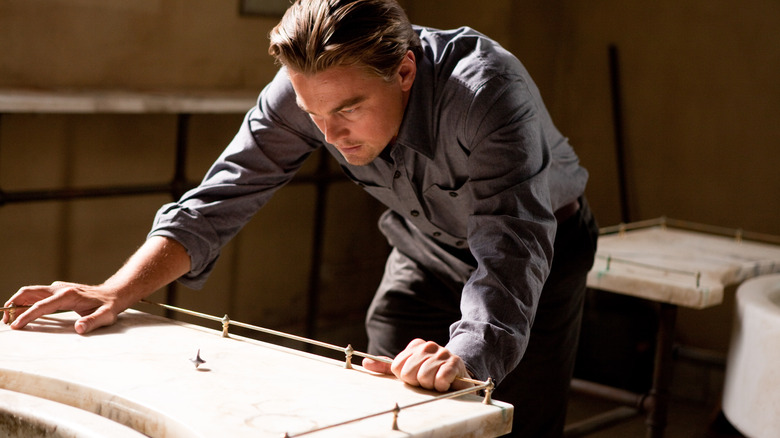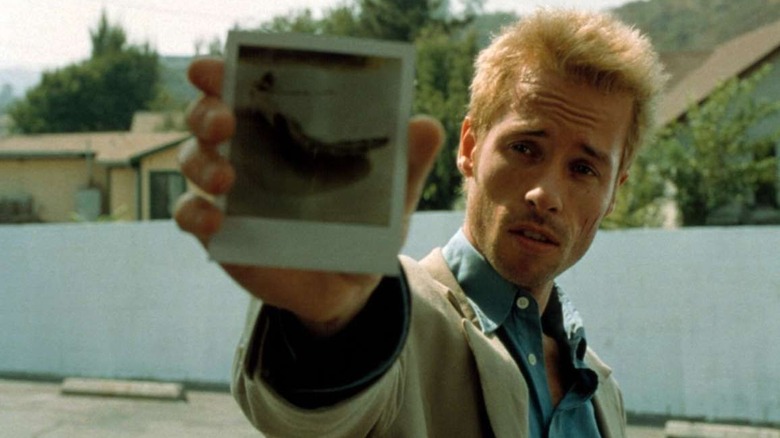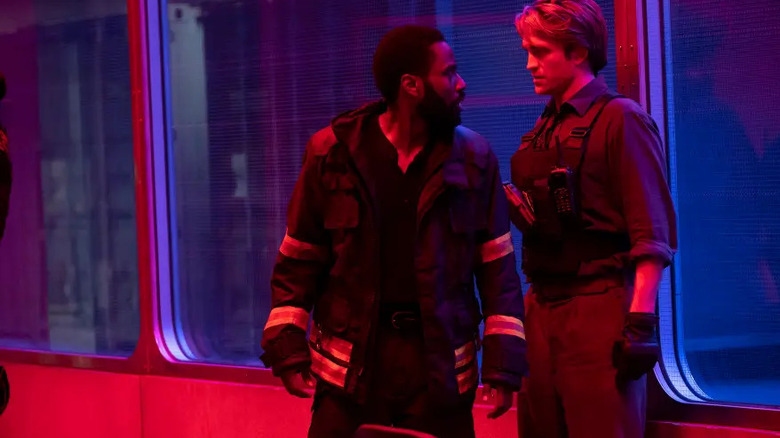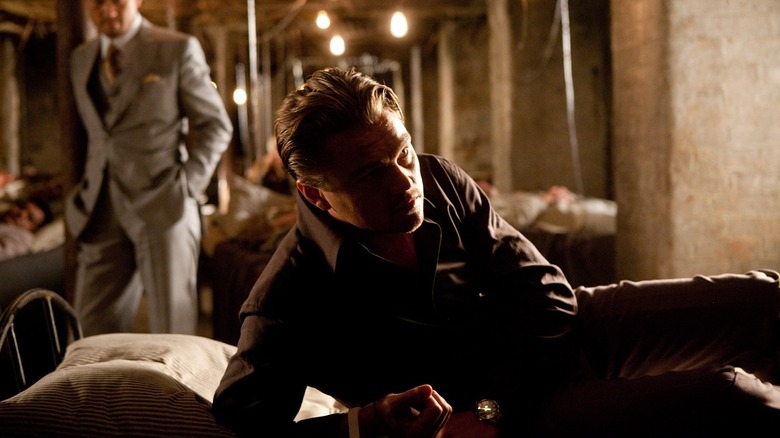
In Christopher Nolan's 2010 film "Inception," Leonardo DiCaprio plays a character named Dom Cobb who works for a mysterious spy organization with the ability to infiltrate other people's dreams. Using a bizarre, suitcase-sized device, he and his fellow suit-wearing agents can enter into a surreal dream space where time moves differently (a few hours in the dream world is but a few minutes in the waking world). Also, when in Dreamland, the agents are subject to the whims of the dreamers, and cities have the ability to fold over without notice. Also, one's own bad memories, traumas, and nightmares can, if one doesn't concentrate on the mission, step in to interrupt. Also, one needs a unique totem in their pocket -- something oddly shaped and heavy to handle -- in order to remind them that they are in the dream world or in the waking world, since one can easily lose track. Also...
Look, the rules are complicated. Indeed, just as much of "Inception" is devoted to explaining its own byzantine mechanics as to its actual story.
The same may be true of Nolan's 2020 film "Tenet." John David Washington plays Protagonist, a CIA agent who is recruited into an ultra-covert cadre of time travelers, and in "Tenet," time travel has a unique set of rules all its own. A character can pass into a time machine, but emerge moving backward in time at the same rate. They exist in the real world, but to them, everything now appears to be moving backward. To everyone else, they appear to be moving backward. Also, they can also affect physics backward, and backward-moving bullets, sucked into guns, somehow do more damage than the regular type. Also ...
Nalon Rehpotsirhc

Look, it's all very complicated. Nolan, who writes or co-writes his own screenplays, is clearly very interested in the flow of time, and the strange function of chronology. Most of his films play with the perception of time, sometimes directly. His 2014 space opera "Interstellar" features several time travel conceits. In one scene, a team of astronauts explores a planet for merely an hour while a year elapses for their compatriot in orbit. In another, the main character sees himself able to peer backward in time through a surreal temporal nexus. Nolan's 2017 war film "Dunkirk" told the story of the famed British soldier evacuation over three separate timelines, with one plot taking a week, one taking a day, and one taking an hour.
Even his 2000 film "Memento," starring Guy Pearce, played with chronology as a function of memory. The protagonist of that film suffered from chronic severe memory loss, forgetting huge amounts of information after only a few minutes. To denote this, Nolan films the events in reverse, telling the story in vignettes that begin at end of the story and work their way to the beginning.
Audiences and critics have a devil of a time synopsizing Nolan's films as a result of his temporal fixation, and some might even have trouble understanding them as they elapse. (Personally, I still can't suss out the physics of "Tenet.") It seems Nolan's own actors also have trouble working things out, and several of them have gone on record admitting they didn't understand the scripts at all.
In a 2020 video interview with GQ, Pearce admitted that he needed a note on his script explaining that "Memento" all goes backward.
'He Was Very Patient With Us'

As Pearce explained:
"Thankfully, when Chris, my agent, sent me the letter and the script, at the bottom of it, in brackets, he said, 'By the way, this all goes backwards.' So, I at least was sort of prepared for that. [...] The other stuff sort of began to make sense more as I then worked with Christopher Nolan and rehearsed with him. And then, funnily enough, once it all made sense to me, I then had to sort of put it all away, let it all go. And then just treat every scene as if it was its own little thing."
Pearce, as an actor, didn't need to necessarily understand the mechanics of "Memento," luckily, because his own character was unaware of it. Indeed, it would serve Pearce's performance better if he didn't have a broad sense of the film's structure in his mind. The experience, however, did leave Pearce questioning his own memory. He admits to looking at old pictures and asking if that was really true.
Washington told a similar story in a 2020 interview with Comicbook.com about "Tenet." However, Washington didn't have the same acting convenience as Pearce, since his character was ostensibly an expert in that film's bizarre temporal mechanics. Washington repeatedly asked his director questions as to how all this was supposed to lock together, and Nolan, to his credit, kept on explaining things as best he could. As Washington said:
"Every day I had questions for him. But he was very gracious, and he answered them very calmly and patiently. [...] It was important that the actors could track the story correctly so we could tell it the best way we could, and he was very patient with us. I say that very politely."
All That We See Or Seem, Is But A Dream Within A Dream

Washington's "Tenet" co-star Robert Pattinson expressed the exact same trepidation, claiming in a 2020 interview with GQ that he filmed all his scenes without understanding the workings of the plot or where he was in the story. It seems that Pattinson, who had not watched "Tenet" at the time of the interview, couldn't recount the plot without aid. When asked for a synopsis, he said, "Even if I had seen it, I genuinely don't know if I'd be able to ... I was just thinking, I just called up my assistant 20 minutes ago: 'What the f*** do I say? I have no idea.'"
On a 2020 episode of the podcast "WTF with Marc Maron," one in which Leonardo DiCaprio and Brad Pitt both appeared, DiCaprio also admitted to be flummoxed by the script for "Inception." Like Washington, his character had to be expert in the physics of his film's world, but DiCaprio never acquired the necessary expertise. Host Maron was asking Pitt about some of the cosmic details of his film "Ad Astra," and Pitt said he didn't quite grasp it. DiCaprio said he could relate with "Inception," never fully grasping how things worked. Eventually, DiCaprio admitted that playing the character took precedent over knowing the broad strokes of the script. That, he felt, was the director's job:
"Sometimes you just -– I mean, you're just focused on your character, man. You know? No, actually I do get involved and like ... but when it came to Chris Nolan and his mind and how that was all pieced together, everyone was trying to constantly put that puzzle together."
Fans of Nolan, it seems, might have a better time of explaining the man's screenplays better than the actors who read from them.
Read this next: Every Christopher Nolan Film Ranked Worst To Best
The post Even Veterans Like Leonardo DiCaprio And Guy Pearce Are Confused By Christopher Nolan's Scripts appeared first on /Film.
0 Commentaires